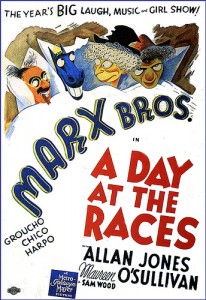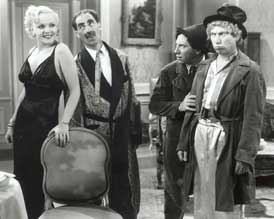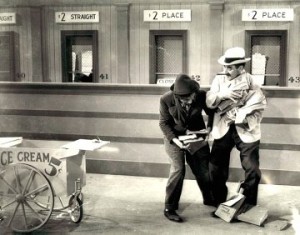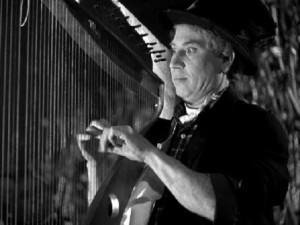 Three Great Laff Stars ! . . . more gags and gals . . . more songs and dances !
Three Great Laff Stars ! . . . more gags and gals . . . more songs and dances !
In the pantheon of Marx Brothers films, 1937’s A Day at the Races is usually lauded as the last of their great films. Perhaps not quite as strong as their just previous A Night at the Opera or as vaudevillian as their earliest films, A Day at the Races is still a strong film in all sense of the word.
This would mark the seventh official Marx Brothers film, and eighth should you count 1921’s unreleased Humor Risk. Groucho, Chico, and Harpo again fulfill their roles as the Kings of Comedy with support this time from Maureen O’Sullivan and Margaret Dumont.
A Day at the Races was the last film the Brothers would make with boy wonder Irving Thalberg, who would pass away from pneumonaia during production. As their greatest champion left them, after Thalberg’s passing the Marx Brothers were left to the mercy of MGM. As the animosity grew so waned the Brothers’ affinity for film, especially Groucho’s. Their films would never be the same.
But to our feature…Groucho is Dr. Hugo Hackenbush, a horse doctor (literally) called in to save a sanitarium owned by Judy Standish (Maureen O’Sullivan). Of course she’s unaware he is a horse doctor, but that plays into several good jokes thereafter. Ms. Standish is in dire financial straits and only pampering a hypochondriacal patient (Margaret Dumont playing Emily Upjohn) for the needed revenue will save the sanitarium.
Ultimately the boys take a lark on a long shot horse, “Hi Hat” in hopes of winning the money they need. In order to get Hi Hat to the race the Dr. Hackenbush and Tony (Chico) must delay the race’s start with increasingly bizarre tactics, including blowing hats off of spectators and soaping the horses’ saddles.
 I don’t think it will spoil it to say that, ultimately, “Hi Hat” wins the race and all ends well. The final shot is off everyone dancing and singing down the street, which was typical for a MGM picture of the time. Unfortunately it seems like something out of The Wizard of Oz or even The Song of the South given the parading glee.
I don’t think it will spoil it to say that, ultimately, “Hi Hat” wins the race and all ends well. The final shot is off everyone dancing and singing down the street, which was typical for a MGM picture of the time. Unfortunately it seems like something out of The Wizard of Oz or even The Song of the South given the parading glee.
Like several other Marx Brothers pictures, the plot is merely a frame over which to lay several skits that in some cases are only loosely related. Again as previously most of these skits were tried out on the road first before live audiences. This not only allowed them to hone the material and gauge it against an audience, but also gave them the opportunity to determine the length of the laughs they got at each joke and adjust their timing accordingly. I’m not sure, but I hope this accounts for the somewhat lengthy pauses at some points in many of the skits on screen. Presumably once the audience quieted again the show would continue.
 Some of the skits are better than others. The best by far is what is known as the “Tutsie Fruitsie” skit, where Chico is a bookie with hot tips in the guise of an ice cream vendor. Groucho comes to the window to place a bet, is approached by Chico, and ultimately purchases half the Library of Congress for a tip. There are other quite strong skits throughout the film, and really no weak ones. As good as they are, in some places they really don’t really come together.
Some of the skits are better than others. The best by far is what is known as the “Tutsie Fruitsie” skit, where Chico is a bookie with hot tips in the guise of an ice cream vendor. Groucho comes to the window to place a bet, is approached by Chico, and ultimately purchases half the Library of Congress for a tip. There are other quite strong skits throughout the film, and really no weak ones. As good as they are, in some places they really don’t really come together.
If there is a negative about the film, it has to be the musical numbers. Although most always a part of Marx Brothers films, here they seem to go on a bit too long, with in some cases little or no involvement of our heroes. Some would best be served being in one of MGM’s better musicals of the day.
 You can always fast forward through the musical sequences, although Harpo creating a harp from a broken piano is a riot. Most inexplicable is the last musical sequence with Harpo leading a group of African American racetrack employees in a wild jitterbug. Probably at the time this was looked upon as forward thinking, but now perhaps borders on something else. Again, it needs to be looked at in context.
You can always fast forward through the musical sequences, although Harpo creating a harp from a broken piano is a riot. Most inexplicable is the last musical sequence with Harpo leading a group of African American racetrack employees in a wild jitterbug. Probably at the time this was looked upon as forward thinking, but now perhaps borders on something else. Again, it needs to be looked at in context.
Many deride A Day at the Races as a far cry from the best of the Marx Brothers. Not so, as this may not be their best, but is extremely close.
Sam Wood reprises his directorial efforts on A Night at the Opera with another good effort. Production values are still quite strong here, showing Thalberg’s involvement. They would never be so good again.
Nor would the Marx Brothers.
Just FYI this is available in a few different DVD releases, including a single disc. However, the version above is only $2 more so three films for $2 seemed a better deal.